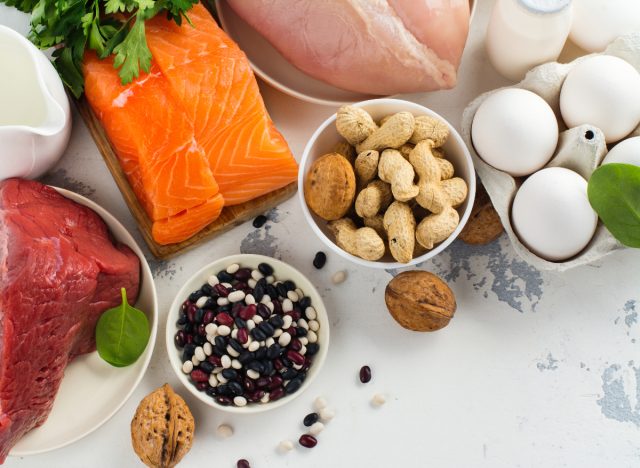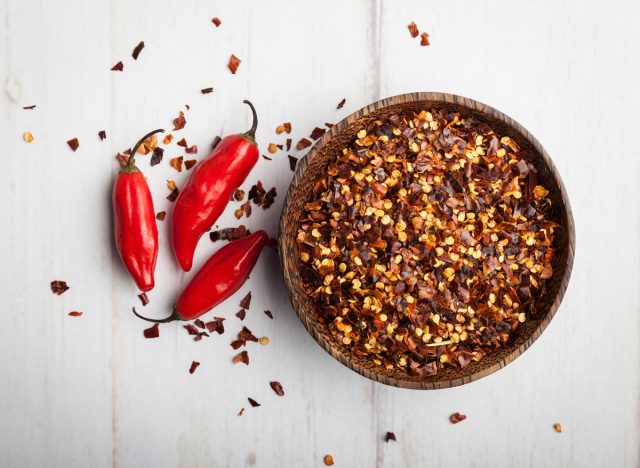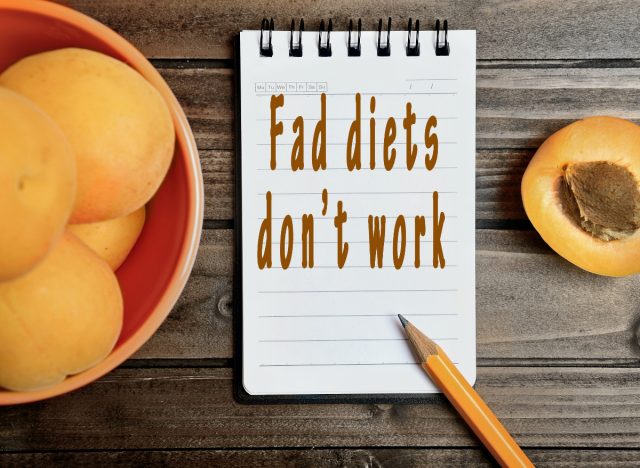10 Secrets to Help Speed Up Your Metabolism

Remember the good old days when you could indulge in seemingly endless goodies without gaining a pound? That was your metabolism hard at work. Your metabolism is your body’s calorie-burning engine that determines how efficiently it converts food into energy. This complex process is essential to weight management and overall vitality. However, your metabolism can slow down as you enter your 30s, 40s, 50s, and beyond. For many of us, gone are the days of chowing down on pizza and cookies without weight gain ramifications. But don’t fret, because we spoke with an expert who reveals 10 ways to speed up your metabolism that you can seamlessly work into your daily routine—and stay consistent with.
There are strategies, habits, and behaviors you can incorporate into your everyday schedule to help speed up your metabolism. Michael Masi, CPT, a certified personal trainer at Garage Gym Reviews, unveils his top tips for speeding up your calorie-burning potential.
Keep reading to learn Masi’s 10 ways to speed up your metabolism, then check out Strength Training for Fat Loss? Here’s How Heavy Your Weights Should Be.
Increase your protein intake.

Protein requires more energy to digest than fats or carbs, which research shows creates a thermic effect that ramps up your metabolism. Whether lean meats, plant-based proteins, or dairy, incorporating protein-rich foods into your meals can be a game-changer for your metabolism.
“Consuming protein can lead to a higher metabolic rate than eating other macronutrients,” Masi explains. “This is due to the thermic effect of food (TEF), which is the energy required by your body to digest, absorb, and store the nutrients from your meals. Protein causes the largest rise in TEF, increasing your metabolic rate by 15 to 30 percent, compared to five to 10 percent for carbs and zero to three percent for fats. Eating protein has also been reported to help you feel more full and prevent overeating, which is beneficial for weight management.”
Drink cold water.

“Drinking water can temporarily increase your metabolism, and if the water is cold, your body expends additional energy to heat it to body temperature,” says Masi. “One study found that drinking roughly 500 milliliters of water increased the metabolic rate by 30 percent in men and women. However, while this effect does exist, it’s relatively minor in the grand scheme of daily calorie expenditure. It should not be relied upon as a primary method for weight loss or significantly boosting metabolism.”
Drinking cold water induces a temporary rise in metabolic rate as your body expends energy to warm the water to body temperature. This simple habit—especially before meals—can help speed up your metabolism while keeping you hydrated.
Do high-intensity interval training.

High-intensity interval training (HIIT) involves alternating between intense bursts of exercise and short rest periods to torch calories during and after workouts.
“HIIT involves quick and intense bursts of activity and can help you burn more fat by increasing your metabolic rate, even after your workout,” states Masi. “The key reason is the phenomenon known as excess post-exercise oxygen consumption (EPOC), often referred to as the ‘afterburn effect.’ HIIT causes a more significant afterburn effect than steady-state cardio exercises, meaning your body continues to burn calories at a higher rate even after the workout is over.”
Don’t neglect strength training.

Studies suggest that increased muscle mass translates to a higher resting metabolic rate. Meaning? Building lean muscle means you’ll burn more calories even at rest—an effective strategy for long-term weight management.
“Muscle tissue is more metabolically active than fat tissue, which means it burns more calories at rest. Increasing muscle mass through resistance training or lifting heavy weights can raise your resting metabolic rate (RMR),” says Masi.
Stand up and move.

“What your body does outside of sleep, eating, and exercise makes up a substantial portion of your day,” says Masi. “The calories burned during this period are called non-exercise activity thermogenesis (NEAT). Simply put, fidgeting, standing, walking, and so on are all better options than sitting as they require more calories and increase metabolic rate.”
Simply standing up and moving throughout the day keeps your metabolism engaged. Whether taking short walks, stretching, or opting for a standing desk, these movements contribute to your daily calorie burn and promote a healthy, active lifestyle.
Drink green tea or coffee.

Your morning cup of green tea or coffee isn’t just a pick-me-up; it’s a solid metabolism booster. Masi tells us, “Green tea is known to have compounds that can slightly increase metabolism and fat burning. The main active ingredients responsible for this effect are caffeine and catechins, particularly epigallocatechin gallate (EGCG). Several studies have shown that these teas can increase metabolic rate.”
Eat more spicy foods.

“Capsaicin, found in spicy foods like chili peppers, is known for its potential to boost metabolism, albeit slightly. It can increase the heat your body produces, making you burn more calories via thermogenesis and promoting fat oxidation. However, many people can’t tolerate these spices at the doses required to have a significant effect,” says Masi.
According to a 2022 review, capsaicin, the compound responsible for the heat in spicy foods, can temporarily increase your metabolic rate and energy expenditure. Consider adding chili peppers to your dishes or adding spices to your meals to help burn more calories.
Get a good night’s sleep.

Research indicates that lack of sleep disrupts hormonal balance, affecting appetite-regulating hormones like ghrelin and leptin. Aim for consistent, quality sleep to support optimal metabolism, energy levels, and overall health.
“Sleep deprivation has been consistently linked to alterations in metabolic processes, hormone imbalances, and an increased risk of obesity and related disorders,” Masi explains. “Additionally, lack of sleep affects the balance of hunger hormones, namely ghrelin and leptin. This imbalance can increase feelings of hunger and appetite, potentially leading to overeating and weight gain.”
Stay clear of crash diets.

Drastically restricting calories signals your body to conserve energy and slow down your metabolic rate. Instead of falling for quick fixes, opt for sustainable and balanced dietary choices that support long-term metabolic health.
“Crash diets may negatively affect the body’s metabolism directly and indirectly,” states Masi. “When calorie intake is very low, your body can enter ‘starvation mode.’ In this state, the body becomes more efficient at using energy, resulting in a slower metabolism. This is a survival mechanism in response to reduced energy availability.”
Consume omega-3 fatty acids.

Found in fatty fish, flaxseeds, and walnuts, omega-3 fatty acids are essential fats that help you maintain a balanced metabolism.
“Omega-3 fatty acids [are] known to decrease inflammation and help regulate blood sugar levels. Omega-3s may also increase the body’s ability to burn fat by enhancing the responsiveness of the hormones that help regulate metabolism, such as leptin,” says Masi.
- Source: https://pubmed.ncbi.nlm.nih.gov/15466943/
- Source: https://www.ncbi.nlm.nih.gov/pmc/articles/PMC7539343/
- Source: https://pubmed.ncbi.nlm.nih.gov/14671205/
- Source: https://www.ncbi.nlm.nih.gov/pmc/articles/PMC4836564/
- Source: https://www.ncbi.nlm.nih.gov/pmc/articles/PMC3649093/
- Source: https://www.ncbi.nlm.nih.gov/pmc/articles/PMC9316879/
- Source: https://www.ncbi.nlm.nih.gov/pmc/articles/PMC9031614/